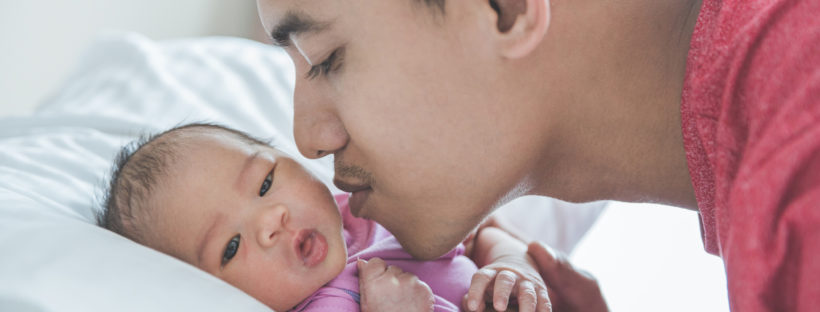Excited, nervous, anxious, scared, overwhelmed, overjoyed — these are just some of the wide range of emotions you’ll feel when you experience the life-changing event that is becoming a parent for the first time.
This Father’s Day, we wanted to provide some tips and advice from our nurses to help ease those first-time parent jitters.
- Congrats on this amazing journey. If you and your partner have made the decision to breastfeed your baby, congratulations! Partner support is one of the biggest long-term indicators of breastfeeding success, so it is important that you support your partner as much as possible. Sign up for breastfeeding class and attend with her and learn as much as you can about how breastfeeding works. After the baby is born, many dads can feel left out because of the amount of time a breastfeeding mom spends with her newborn in the beginning, while the breastfeeding relationship is being established. Support mom and get your own bonding time in by doing the diaper changes, burping the baby, and bathing the baby. Encourage and support mom when she is lacking confidence, and help her find resources if things aren’t going well. Although you can’t breastfeed the baby, there are many ways that you can be close to the baby and take part in the care of baby and mother.
- Spend time with your baby and create a ritual or activity that is yours alone. Bonding and special time are important for you and your baby too.
- Participate in skin-to-skin. Bring a sweatshirt with a zipper to the hospital. During skin to skin with their baby they can take off their shirt wear their sweatshirt and zip the zipper up with their baby on their chest. Also when newborns are very fussy or crying, it is almost magical to see how quickly baby calms if dad takes off his shirt and places baby skin to skin on his bare chest.
- Your involvement is uniquely influential in the health status of your child. Each moment spent holding, bathing, feeding or reading to your baby, facilitates their growth and development. You are irreplaceable in the context of the coaching, modeling, teaching and encouragement that you instill. If you have an insecurity regarding your ability to balance work and families responsibilities or perhaps your own fathers involvement, remember that you are not alone. Forgive yourself when you make mistakes. Your contribution, point of view and playful attitude are necessary pieces of the puzzle which will guide and shape your child’s life – which cannot be replaced. A father’s love is unrivaled!
- Ask questions. If you are unsure of something, please don’t hesitate to ask your nurse or doctor.
- Take notes during discharge. You and your partner just welcomed your brand-new baby in the world, and now it’s time to bring the little one home. Mom is often exhausted and overwhelmed, be sure to take note of key points when the nurse is providing discharge information that you can share with your partner when you get home after she’s had time to decompress.
- Know when to say no. It’s okay to stand your ground and turn away visitors if you and your partner aren’t up for it.
- Mothers aren’t the only ones who suffer from postpartum depression/anxiety (PPD/A). Fathers experience depression and anxiety too. Symptoms include depressed mood; significant weight gain or loss; restlessness; fatigue; insomnia or sleeping too much; feelings of worthlessness; difficulty with decision-making; and thoughts of suicide or death. It is important to watch for changes in mood or behavior, especially since you and your partner have just had or adopted a baby. If you suspect that you or a loved one is suffering, get help and contact your doctor. You can also check out these online resources.
- Savor this time. It seems like the older children get, the faster the time flies. Slow down and treasure these moments while they are still small.
- You are your child’s biggest hero. In their eyes, you are everything they aspire to be. Be their best role model and biggest cheerleader. This means more to them than anything.


 by, Melissa Strunc, RN
by, Melissa Strunc, RN The first general session had so many “ah-ha” moments for me, I don’t even know where to start. Not only was the presenter knowledgeable, but her words touched my heart and soul. It was uplifting and encouraging, at the same time challenging and convicting. As I sat there, I found myself wishing she could do the entire conference – and she’s not even an OB nurse! I left with tears in my eyes, and her presentation wasn’t even sad!! THANK YOU, Captain Beeson! I will definitely be hunting down these slides and sharing her words with my colleagues and managers concerning resilience!
The first general session had so many “ah-ha” moments for me, I don’t even know where to start. Not only was the presenter knowledgeable, but her words touched my heart and soul. It was uplifting and encouraging, at the same time challenging and convicting. As I sat there, I found myself wishing she could do the entire conference – and she’s not even an OB nurse! I left with tears in my eyes, and her presentation wasn’t even sad!! THANK YOU, Captain Beeson! I will definitely be hunting down these slides and sharing her words with my colleagues and managers concerning resilience!